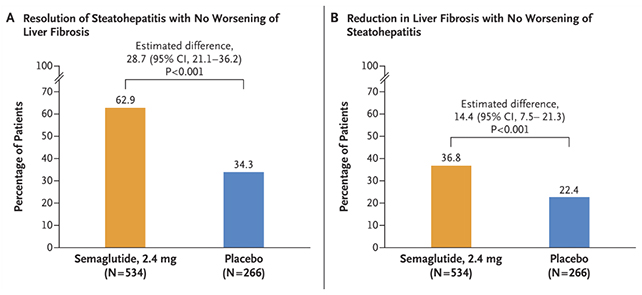Semaglutide is the key component of weight loss and diabetes drugs like Ozempic and Wegovy, and an international team of researchers has now discovered it can also do wonders for people who have developed liver disease.
In a phase 3 clinical trial involving 800 participants and lasting 72 weeks, a weekly dose of semaglutide was effective in almost two-thirds of patients at treating a serious form of fatty liver disease known as Metabolic Dysfunction-Associated Steatohepatitis (MASH).
"The results from this landmark study across 37 countries provide strong evidence that semaglutide can help patients with MASH by not only improving liver health, but also addressing the underlying metabolic issues that contribute to the disease," says Arun Sanyal, a professor of medicine at Virginia Commonwealth University.

The participants were split into two groups. Of those given the semaglutide treatment, 62.9 percent saw improvements in their MASH, compared to 34.3 percent of the group given a placebo treatment instead.
What's more, liver fibrosis (scarring) – which happens as the liver tries to repair damage – was reduced in 36.8 percent of patients given the semaglutide treatment, compared to 22.4 percent of patients given placebos.
Improvements in both MASH and fibrosis were seen in 32.7 percent of the participants on semaglutide, compared to 16.1 percent of the placebo group. It's a comprehensive win for the drug, which is showing potential in many different areas of health.
That placebo effect is fairly typical, by the way, and often happens in trials: it's thought to be a combination of the psychological boost of thinking you're being treated, plus a tendency to live more healthily and carefully if you know you're part of a study.
"If approved, this could offer an additional therapeutic option for patients with MASH and fibrosis," says Sanyal.
"This is crucial, given the strong link between MASH and cardiovascular, metabolic, and renal conditions, where semaglutide has already shown established health benefits."
Semaglutide is a GLP-1 (glucagon-like peptide-1) receptor agonist, essentially acting like the natural GLP-1 hormone to help regulate key metabolic processes – including reducing appetite and lowering blood sugar.
That makes it effective for treating obesity and diabetes, but this boost in biological regulation seems to have plenty of other benefits too. When it comes to liver disease, the thinking is that the metabolism and anti-inflammatory improvements triggered by the drug help to treat some of the key drivers of MASH.
This clinical trial is continuing, expanding to a larger group of people for a full five years to see if these initial improvements continue. With only one approved treatment available for MASH, new options are urgently needed.
"By treating both liver disease and its metabolic causes, semaglutide offers a promising new approach for millions of patients," says Sanyal.
The research has been published in the New England Journal of Medicine.
